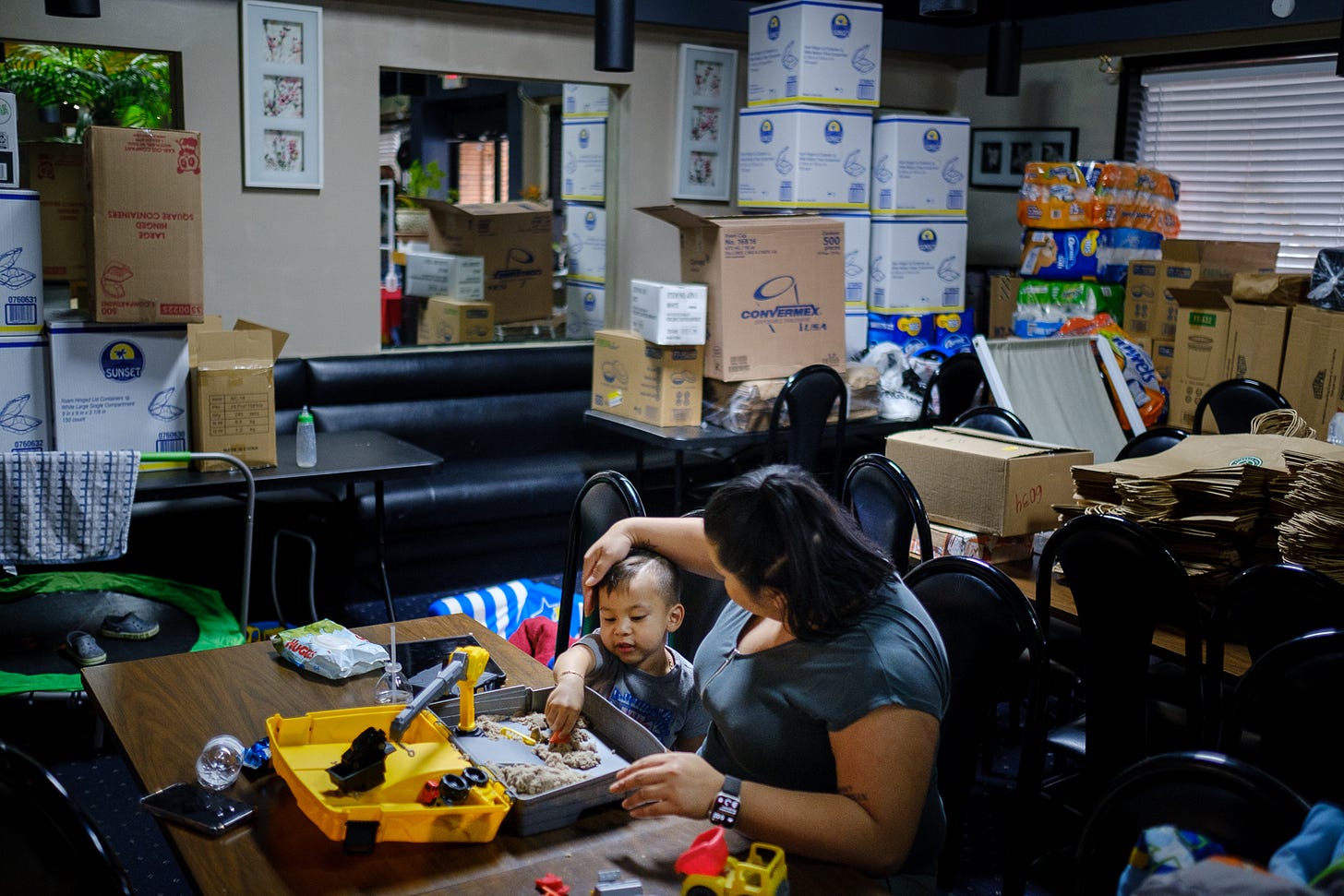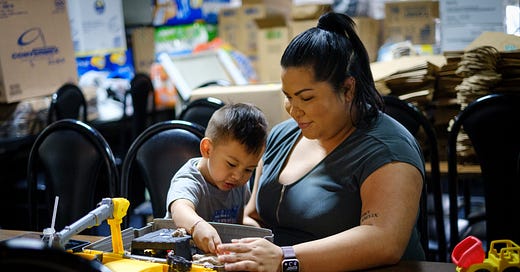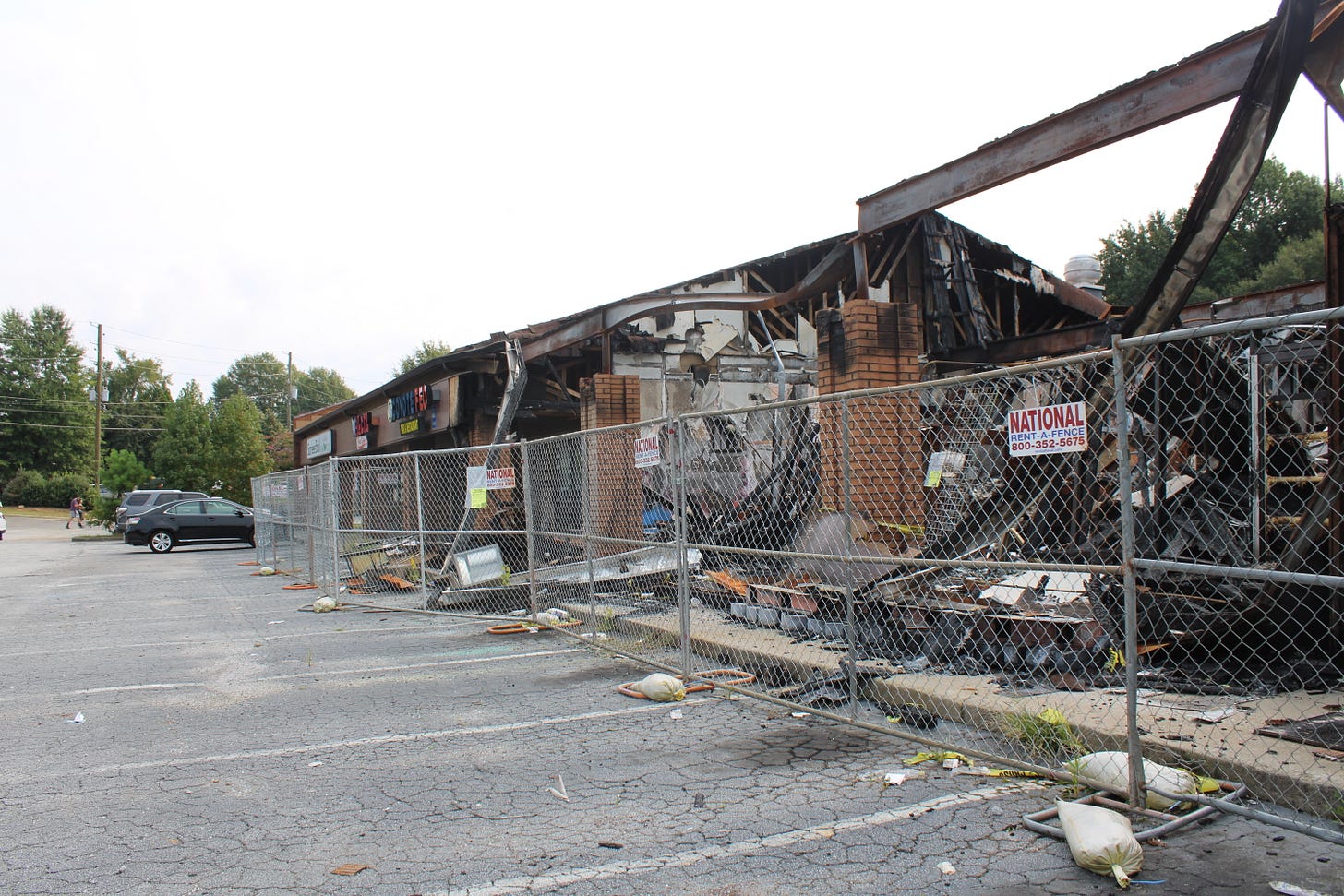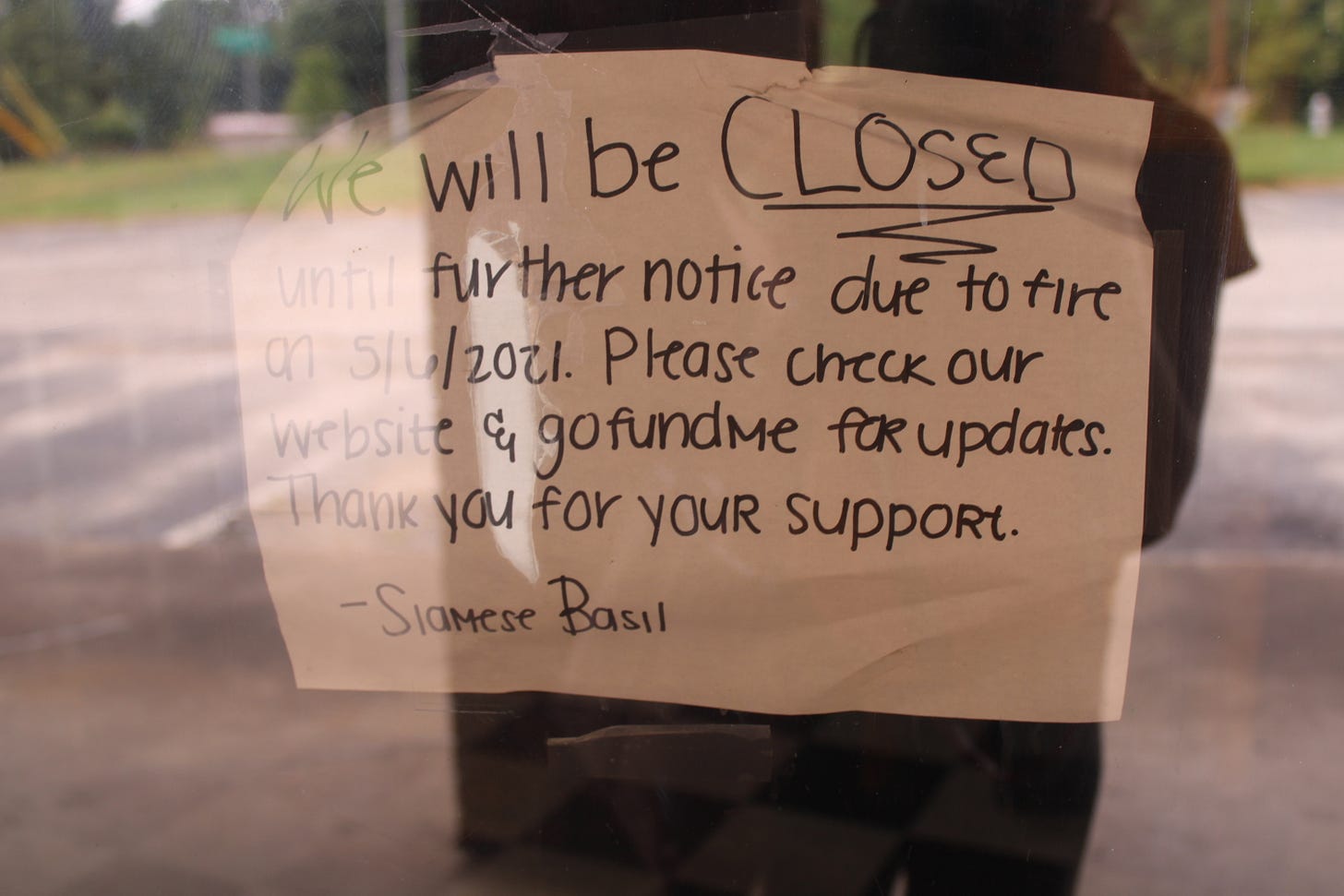285 South Long Read: “We wouldn't be who we are without the restaurant.”
After the pandemic and a devastating fire, one Thai family grapples with its legacy and its future in Atlanta.
With her two year old son Akana circling around her legs, Jintana Ortiz looked through the chain link fence at the small strip mall that has defined her life. The restaurant that her parents have owned for almost two decades sits at one end of the building.
The pandemic had already already taken its toll on the restaurant. Then on May 6, 2021, a devastating fire tore through the strip mall. Three of the Colony Village Plaza’s five businesses were completely destroyed. Just the restaurant, Siamese Basil Thai, and the neighboring hair salon were left.
For months, the charred contents, burned signs, and hollowed storefronts stared out at the street, untouched. Tenants said there had been no attempt by the landlord to either renovate or demolish the building.
An informal economy began to take hold amid the debris. Vendors put up tents in the parking lot, selling 10 dollar t-shirts, snacks and fruits to passersby. When winter came, and the temperatures dropped, Jintana spotted squatters moving into the spaces where her fellow tenants once worked.
Things weren’t always this way.
Siamese Basil Thai sits on South Norcross Tucker Road, one of the many arteries feeding into Jimmy Carter Blvd, a bustling six lane economic powerhouse in immigrant Atlanta. This area is filled with Hispanic and Asian owned businesses.
The restaurant marked the beginning of Jintana’s family story in Georgia. Every square foot of it is filled with her memories: sitting at tables trying to finish homework between bussing duties; summers playing in the parking lot with the children of the other tenants; scribbling on the walls of the back office with her brother.
As a child, Jintana hated it. The restaurant was the reason she didn’t have a typical American childhood. She didn’t get to hang out with friends, go to prom, or even hang out at the mall. If she wasn’t at school, she was here, helping the family business.
But the restaurant also made it possible for her parents to buy a home and for her to get a college education. She says that now, the idea of having to point to Colony Village Plaza one day and tell her son that the restaurant his grandparents owned was once here, but now is gone, is almost unbearable.
“Regardless of how I felt about it growing up, that restaurant, we owe our lives to it.”
Growing up at Siamese Basil Thai.
Jintana’s parents met in a Thai restaurant. One 350 miles south of here, in Florida.
Her father, rather than return home to Thailand after a stint working on oil rigs in Saudi Arabia, had decided to try his luck in the United States. And her mother had come to America after her family’s farm suffered a bad crop season.
They both found work at a Thai restaurant in Jacksonville. Her dad worked as a dishwasher and her mom was a cook.
Jintana was born, then her brother Matthew. When a new owner took over the Jacksonville restaurant and working conditions worsened, her parents spoke up and rather than respond to their concerns, the owner fired them. So her parents drove up interstate 75 to Atlanta, and found work in the restaurant in Colony Plaza. Then, in 1995, when those owners decided they wanted to sell, her parents jumped at the opportunity.
“My parents scrapped every penny they had and offered to buy the restaurant. And they started from there.”
As toddlers, Jintana had to find ways to occupy herself without getting in her parents’ way. She and Matthew played in a tiny storage closet in the back by the kitchen. When they misbehaved, they hid from their parents silently under the tables.
When she grew older, she learned to juggle school work and restaurant work. “When a customer walked in, I had to stop, go tend to them, and then come back to the math problem.”
There was no time (or money) for ‘normal’ childhood activities. “We don't know how to ride a bike, we can’t swim, we only know how to fold napkins into whatever shape you want.”

Siamese Basil was a tight, family run operation and they depended on each other to keep it going. “I used to be the cashier. My brother was a dishwasher. My dad was a server, and my mom was the cook.”
“We wouldn't be who we are without the restaurant.”
The Fire on South Norcross Tucker Road
During the first week of May in 2021, Jintana and her family were starting to feel hopeful after months of strain from the pandemic. She’d quit her job at a law firm and was back working at the restaurant. Anticipating a busy Mother’s Day weekend, her father ordered 20 cases of chicken that week instead of the usual four. They stored gallons of Thai tea, and stocked everything in their newly renovated kitchen.
On Wednesday, May 5, Jintana said things started to feel off. Her mother and brother were trying to get into the restaurant, when the key got jammed. “My mom was like, damn it. This key that I’ve been turning for 30 years has finally given out. I hope I don’t have to turn this key much longer.”
Then, on Thursday morning at 6am, Jintana saw she had a missed call on her phone from Indra, the woman from the hair salon next to the restaurant.
“I called her back and was like, why are you calling me so early?” She told Jintana that the building had caught fire. Jintana couldn’t quite comprehend what she was being told. “I was like, are you sure? Are you pulling my leg?”
After she hung up, she looked up the news on her phone. “I saw the Plaza and I was like...this can't be true.” She immediately called her dad, waking him from his sleep and breaking the news. “I heard him yelling for my brother, saying let's go to the restaurant.”
The rest of the day didn't feel real. Her brother and father went to the Plaza, but couldn’t get into the restaurant. “There were police, an arson investigator, firefighters everywhere.” The other business owners were gathered in front of the building - stunned by what they were seeing.
By 7:30am, a local TV reporter tweeted that the fire had been put out.
The lanes on South Norcross Tucker Road that had been blocked by the fire trucks were open again. Traffic began to flow.
For everyone outside of the Plaza, life moved on. For the tenants, everything had changed.
The Mexican restaurant La Fragua, the sporting goods store Deportes Mundial, and the convenience store Coyote Feo were beyond rescue. Siamese Basil and the hair salon had escaped the very worst of the damage, although the electrics were fried.
The owners of all five businesses wondered what they were going to do next.
A life beyond the restaurant. Or not?
Growing up, Jintana's dad had always told her that if she worked hard and went to school, she wouldn’t have to work in the restaurant when she was older.
She enrolled at Georgia State University in 2009, where she majored in psychology. After graduating, she got a job in the legal field and worked at a number of law firms in different capacities. Her language skills are coveted in an increasingly diverse Georgia - she speaks English, Spanish, Thai, Laotian, and Hmong.
Still, her ties to the restaurant, or her family, or both, kept pulling her back. “I worked all the way out in Cobb County. And whenever I would come home, I would stop by the restaurant to see if I could help.”
When the pandemic hit and she had a baby, she became one of the over 5 million mothers across the country who had to stop working to take care of her child. Her parents were aging, their business reduced to takeout orders after being closed for months, and she found herself helping out as much as she could. “You know, that’s Asian families.”
She’s now back working at a law firm as a paralegal, but between the recent Omicron surge and daycare staffing shortages, Jintana decided to keep her son with her brother at the restaurant. A table with Akana’s toy trucks and a small sandbox are sandwiched between tables piled high with boxes of takeout containers.

“I promised myself my kid was never going to be stuck in the restaurant. Look at where he's at,” she said, pointing to a makeshift bed on the floor where Akana is sleeping.
The aftermath of the fire.
It’s been more than six months since the fire, and it’s still not clear what exactly happened. In September, a spokesperson from the Gwinnett County Fire Department said that the case was closed with the cause being undetermined. A call to the private investigator on the case led to a referral to a representative for the insurance company Liberty Mutual. That representative didn’t respond to calls or emails.
Jintana and the other business owners have their own theories - but no resources have been put into investigating any of their suspicions.
So they've had to move on, and focus on just surviving. The four other tenants in the building, said Jintana, didn't have insurance and had no way of recouping their losses.
Jintana's family had insurance, but navigating between the insurance company and the landlord was complicated. The insurance didn’t kick in automatically, since, even months after the fire, she said the landlord hadn't communicated what the plan was for the building. “The landlord can't give a definitive answer if they're going to demolish the building, or if they're going to rebuild. And the insurance doesn't want to pay for anything at all until there's something in writing.”
And even though the restaurant had suffered from electrical damage, Jintana says the landlord expected them to stay open, “The same day that the fire occurred, the gas line, the power lines were all destroyed. They wanted us to continue staying open so they could charge us rent. I was scared. I thought it was gonna blow up on us.”
Despite the rent mounting, Jintana’s family decided to close the restaurant while they figured out what to do.
Taking legal action also seemed almost impossible, since there was no solid paperwork to stand on. “We don't even have a lease agreement to be completely honest." They had hoped their long standing relationship with the landlord ("they've been our landlords since we opened") would count for something, but it didn't lead to any leniency on rent payments or otherwise.
The month to month, informal arrangement they had with the landlord wasn’t unique. The family that ran the hair salon was in a similar situation. When asked if they had a lease, the sister who helps run the salon responded, “Yo creo.” I think.
There also didn’t appear to be any form of assistance they could access from the local government. The office of the Gwinnett County Commissioner for the area said they were familiar with the fire and the impacted businesses, and that they are “looking into the County’s response at the time.”
With no obvious avenues of support, Jintana launched a GoFundMe, urging loyal customers to donate money to sustain the restaurant through the difficult time. Cathy Rivera, owner of the Mexican restaurant La Fragua, did the same. Money came in and dozens of customers sent them encouraging messages, but neither reached their fundraising goals.
The tenants had a choice - somehow rebuild what was left of their businesses at their own expense, or accept the loss and move on. Jintana’s family wasn’t sure what to do - so they waited.
What next?
From May to October 2021, Siamese Basil’s doors were closed. Jintana and Matthew used the time to take stock of the restaurant. The rent they owed was stacking up, but the restaurant wasn’t bringing in any income. The landlord had been hard to reach, and they still weren’t certain about the fate of the building itself.
Their parents started helping out at a relative’s Thai restaurant in Duluth. They weren’t used to having spare time. “They’ve worked every single day of their lives. Even during the pandemic, they would go to the restaurant to clean,” said Jintana.
Jintana and Matthew wanted to open the restaurant again, but struggled to see a real future for it. Their parents had been running it for almost two decades, and changing or updating the restaurant in any dramatic way was unlikely at this point. “We’re never going to be a Panda Express,” said Matthew.
And moving the restaurant to a new location would have its own challenges. “It would take a long time to get back to where we were - just to find a new location and find a new clientele base again,” he said. “Maybe it's better for us to just go and do corporate jobs. Because my friends who have corporate jobs, they have a nice cushy retirement and health care. Restaurants don’t have that. It's a very tedious job, like, 12 hours a day. And it's very thankless.”
But the loyalty to their parents and a desire to preserve the family legacy is not something that’s easy to shake off. And, Jintana missed the customers. Dishes like their signature three flavor chicken and traditional green curry (“my parents are old school…we don’t use food coloring, we use spinach leaves and fresh herbs from my mother’s garden”) kept customers wondering when they would open again. Siamese Basil’s online reviews are full of people who’ve been coming back for the food, and customer service, for over 15 years. Without the restaurant, a lot of those connections would be lost. “It's really heartwarming to see that food really connects you to people,” said Jintana.
And yet, she couldn’t deny the fact that she wanted to build a different future for her son.
Siamese Basil opens its doors again: "It's overwhelming."
Siamese Basil opened for takeout in late October 2021, but since half of the plaza is still hollowed out, it’s not obvious that any establishment there is open for business. The insurance company covered the costs required to ensure the restaurant was operable again, said Jintana, after the landlord finally submitted a statement saying they weren’t going to demolish the building.
The landlord didn’t respond to multiple requests to comment for this article.
Customers have been trickling in as they find out that the restaurant is offering carryout. Weekends have been busier, and Jintana has found herself back at the restaurant, helping out when she’s not at the law firm.

Being open again, she said, is overwhelming.
For one, there are supply chain issues. In late 2021, reports on shortages of takeout containers emerged across the country. On New Year's weekend, it hit home, or, it hit the restaurant. They ran out of takeout containers. “I had one customer who literally was like, what if I bring my own container? There was nothing left. It was bad.”

Inflation has caused a surge in costs for staples like rice and fish sauce, forcing them to increase their prices. “We had customers who will leave a Yelp review that this was so expensive and, you know, we don't get to control how much things cost, and we have to be able to keep the lights on.”
Perhaps the biggest challenge has been the passing of time. Her parents are getting old. Every day her father drives to restaurant suppliers to load the car up with groceries - a task that was much easier when he was younger. “My dad is in bad shape….and my brother can’t go with him, because he’s working at the front. So, our hands are tied. And honestly, I don’t know how much longer they have it in them to keep doing this.”
High costs and the ups and downs of the pandemic have forced restaurant owners across the metro area to reassess their businesses. Two Thai restaurants close to Colony Village Plaza, Kokai and Thai of Norcross, have closed or moved in recent months. Siamese Basil is now the only one left in the area. A boon in some ways, a burden in others. The restaurant has picked up new clientele and customers are eager to dine-in. But Jintana doesn’t see that happening anytime soon.
“It's just so risky. We can't really afford for anything to happen to any of us. Because it's just my mom, my dad, Matthew and I.. .So if one of us were to get sick, what are we going to do?”
And so the future of a restaurant and it's hold on three generations of a family in this corner of immigrant Atlanta, is waiting for a decision; one delayed by duty, by memories, and by circumstances beyond their control.
“Everything we know is because of this restaurant. This has literally been the end all be all for us.”
















